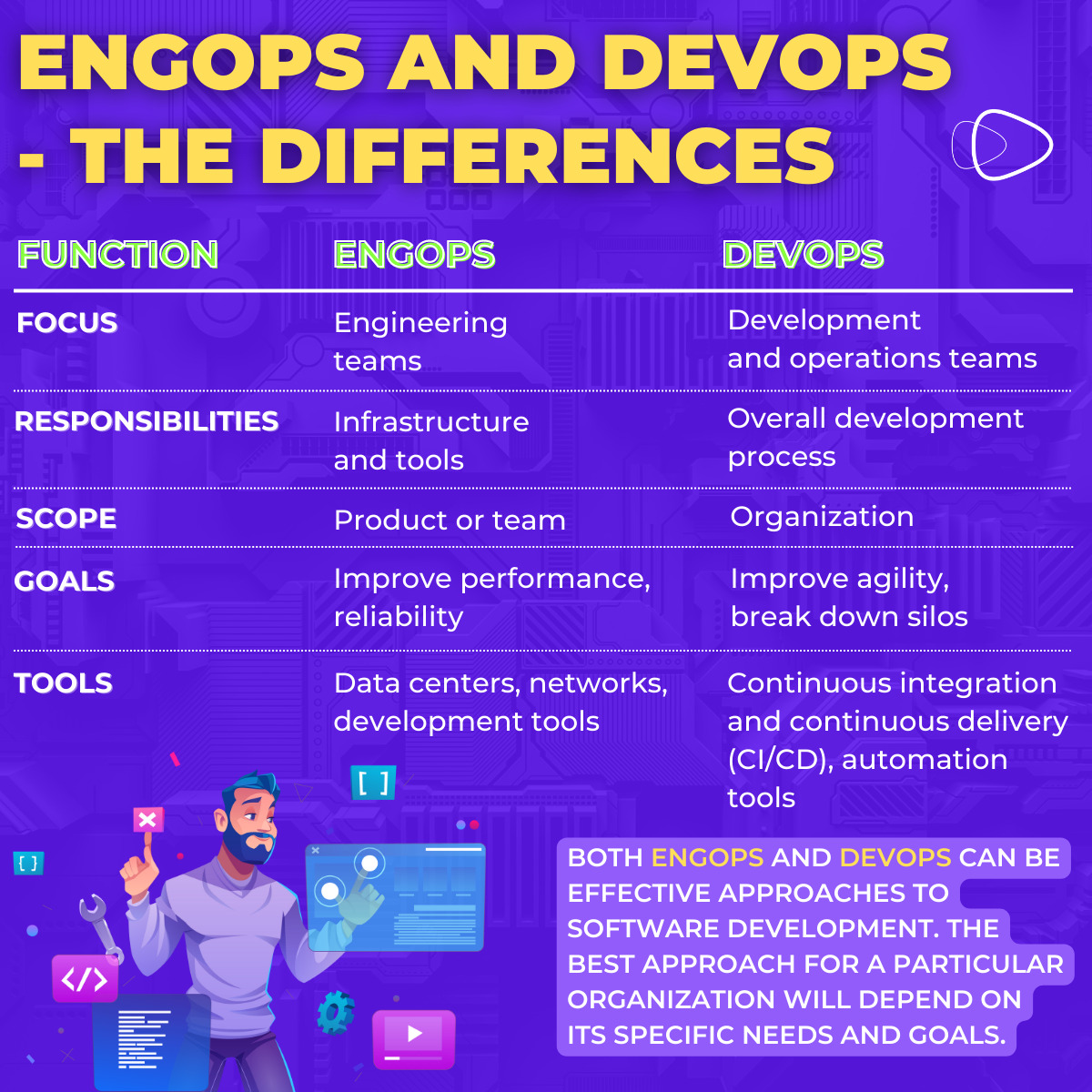EngOps is a model that combines engineering and operations to improve the efficiency and reliability of software delivery. EngOps teams are responsible for the entire cycle – from development to deployment to operations.
Engineering Operations – a new approach
EngOps – Engineering Operations is a new approach that focuses on optimizing and streamlining the operational aspects of software development and engineering processes. Combining software engineering principles and IT operations, it aims to create a seamless and collaborative environment that enables teams to deliver high-quality software efficiently. The model emphasizes automation, continuous improvement and cross-functional collaboration to meet the challenges of modern software development.

Engineering Operations is a new approach that focuses on optimizing and streamlining the operational aspects of software development and engineering processes.EngOps has its roots in DevOps
The EngOps methodology has its roots in the DevOps movement, the most popular set of software delivery practices today.
EngOps takes it further by combining engineers and operations specialists into one team. This allows EngOps teams to take a holistic view of the software delivery cycle. Also to take a more proactive approach to monitoring and troubleshooting.
The EngOps model is responsible for:
– Defining and implementing software development processes
– Building and maintaining the infrastructure
– Testing and deploying the software
– Monitoring and troubleshooting software systems
– Securing software systems
Engineering Operations teams work closely with developers, engineers and other stakeholders. All to understand their needs and ensure that the software delivery process is efficient and reliable. They use various tools and techniques to automate tasks, improve communication and break down silos between development and operations.
The EngOps model supports organizations in the following ways:
– Reduce time to market for new software,
– Improve software quality,
– Increasing the reliability of software systems,
– Reducing costs,
– Improving organizational agility,
The Engineering Operations model is a relatively new approach in software delivery. However, it is gaining popularity among organizations of all sizes. It is a good solution for organizations that want to improve the efficiency and reliability of the software delivery process.
Practitioners of the EngOps model see many advantages in it:
– Increased efficiency: EngOps teams can help automate tasks and improve communication between development and operations, leading to significant productivity gains.
– Increased reliability: EngOps teams can help increase the reliability of software systems by implementing preventive measures and responding quickly to problems.
– Cost reduction: EngOps teams can help reduce costs by automating tasks and improving efficiency.
– Improved agility: EngOps teams can help improve an organization’s agility by making deploying new software and responding to market changes easier.
If you’re looking for a way to improve your software delivery process’s efficiency, reliability and agility, the EngOps model is a good option.
Differences from the DevOps model

EngOps and DevOps - the differencesAlthough EngOps has some similarities to DevOps, there are apparent differences between the two models:
- Scope: EngOps focuses specifically on the engineering and development aspects of the software development lifecycle, while DevOps covers a broader range of operations, including IT operations and systems administration.
- Emphasis: DevOps has traditionally emphasized collaboration between development and operations teams to achieve faster and more reliable releases. EngOps extends this collaboration to a broader range of engineering functions, including design, coding and testing.
- Automation: While both models prioritize automation, EngOps places a strong emphasis on automating engineering processes, such as code review, testing and design validation, in addition to operational tasks.
- Metrics and quality: Engineering Operations emphasizes metrics related to software quality, engineering performance and code health. The focus on engineering-specific metrics helps drive continuous improvement in the development process.
- Cross-functional collaboration: EngOps promotes collaboration between engineering disciplines, such as front-end and back-end development, UI/UX design and architecture. This broader collaboration fosters a holistic approach to software development.
DevOps focuses on the broader operational aspects. Engineering Operations, on the other hand, focuses on the specifics of engineering and development. This makes it a valuable approach in the modern software development environment.

